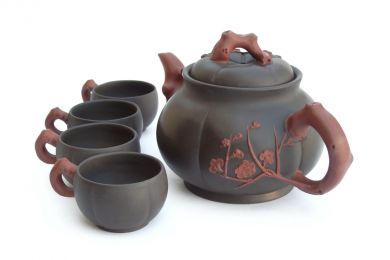Juin 132012

- The standard number of guests for a small meeting is between 4-5
- Shokyaku means guest of honor or the first guest while the the second guest is called a Jikyaku and Kyaku are all other remaining guests.
- The Tsume, or last guest have a special rank and designated seating in the Chashitsu (tearoom)
- Because of their seating order or ranking , they have duties to perform during the tea ceremony. For example, the Shokyaku, or the guest of honor , is the primary person to communicate with the Teishu.
- The Shokyaku asks the Teishu where certain tea utensils originated, where they were made and by whom.
- When asking questions, the Shokyaku has to use polite language and speak clearly. He must consider the correct timing of his questions so that the tea-host is not unduly troubled and always thanks the Teishu for his replies to the questions.
A. Receiving and eating Wagashi
These sweets are to be eaten only after the Teishu has already warmed the Chawan with hot water from the Kama and has disposed of the waste water.
B. Drinking Koicha
- Get the tea bowl or chawan
- Bow
- Prepare to drink the tea
- Clean the rim
C. Usucha
The Shokyaku asks the other guests whether they had enough or if they want more green tea.
If the guests don’t want any more tea, the Shokyaku will then request the Teishu to fix and clean up the equipment and end the ceremony.
II. History of the Japanese Tea Ceremony
III. Types of the Japanese Tea Ceremony
IV. Preparing tea
V. Equipment used during a tea ceremony (temae)
VI. Tea Ceremony Equipment for Guests
VII. Rank of Tea Ceremony Utensils
VIII. Room Preparation for tea ceremony
X. Etiquette for Guests